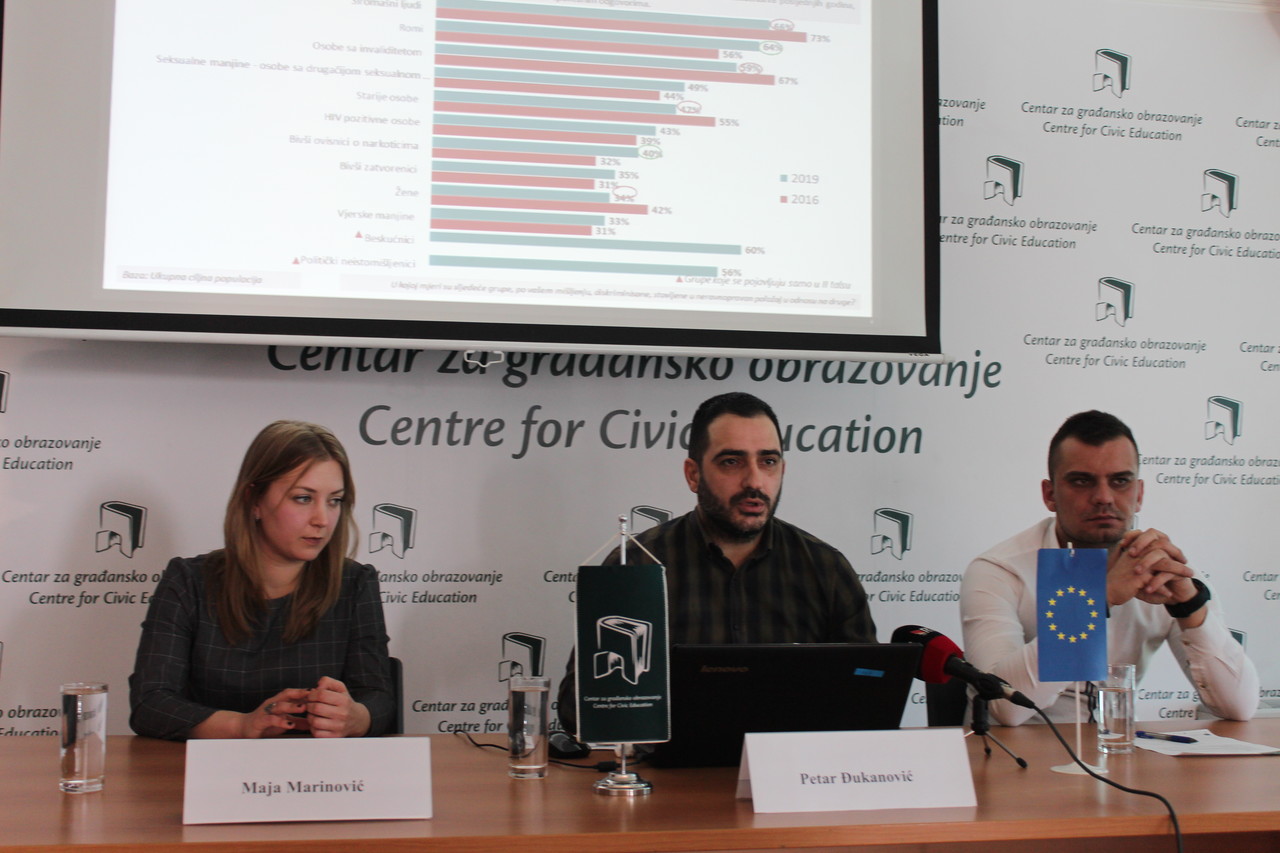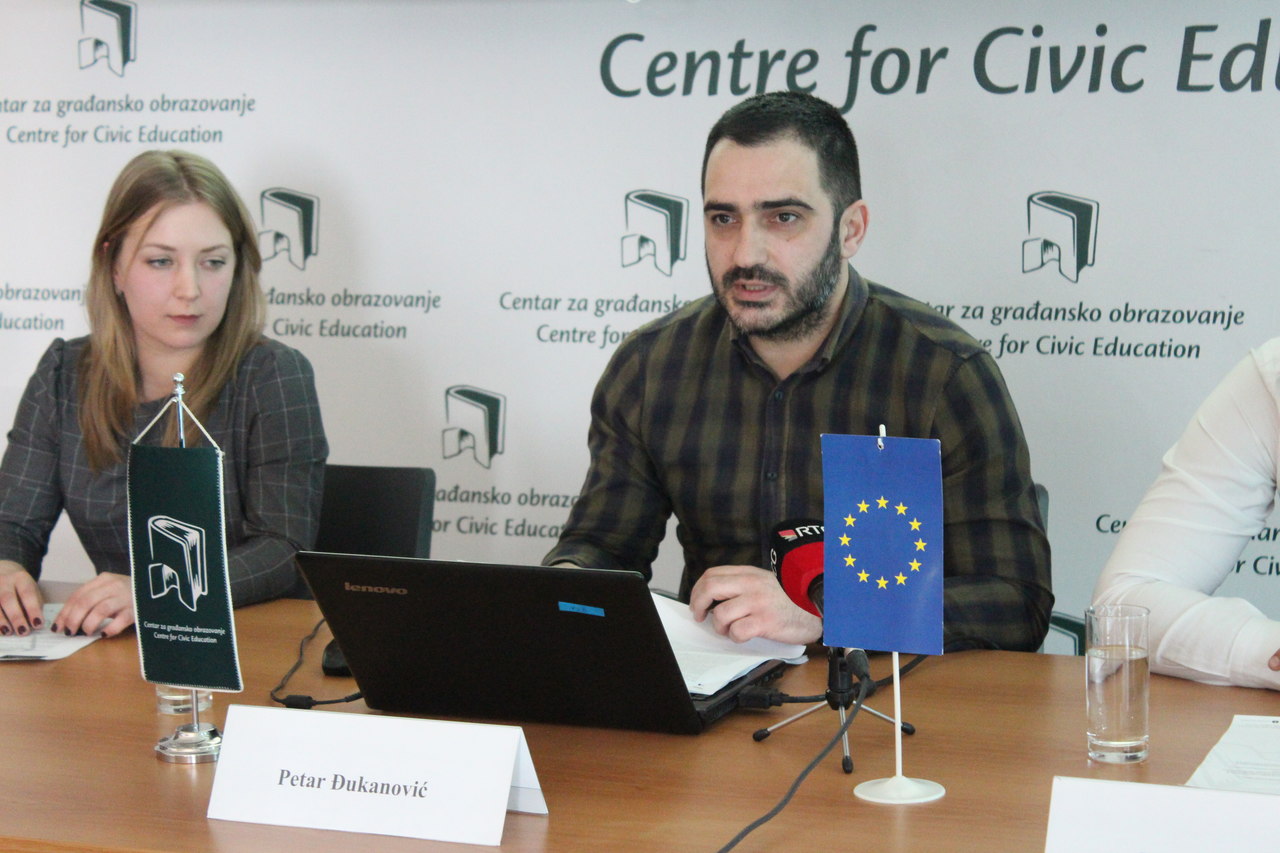Citizens believe that poor people, Roma, homeless, persons with disabilities and political dissidents are to the largest extent exposed to discrimination, as the findings of the public opinion research about discrimination, which Centre for Civic Education (CCE) has presented today, indicated.
‘In overall, citizens are familiar with concept of discrimination, but there is plenty of space for improvement of informing and knowledge about this occurrence, as quarter of respondents does not know or has no attitude about this issue‘, emphasized Petar Djukanovic, Human Rights Programme Coordinator, during the presentation. He pointed out that the most common associations to discrimination remain rejection or exclusion from community, making differences/non-respect of personality and jeopardizing/deprivation of human rights, as it was also in 2016, but that in 2019, recognition of material differences is in increase.
Djukanovic stated that ‘three-quarters of citizens of Montenegro estimate that deprivation of some right on the basis of some personal characteristic is not justified, with no exceptions, while one-fifth finds justification for deprivation of some right to certain group or an individual. This data is concerning, because it points to the fact that certain number of citizens does not understand that discrimination in any of its form is always forbidden’.
‘Similar as in previous research, more than half of citizens of Montenegro deem that discrimination is present within Montenegrin society in 2019 as well. Discrimination is mostly being recognized during job-search and employment, then at the work, in the school or at the faculty’, stated Djukanovic. More than half citizens (58%) perceive increasing discrimination in our society.
‘Poverty is strongly holding on the list of features perceived as an obstacle to equal approach, thus poor people remain mostly discriminated group (66%), as per perceptions of citizens, and amongst first five are also Roma (64%) and persons with disabilities (59%). However,compared to 2016, instead of LGBT and elderly, this list comprises homeless (60%) and political dissidents (56%). These two groups have not been previously stated as an option which the respondents have opted for. Escalation of socio-political context, as well as more frequent presence of homelessness in the last years, have motivated us to offer them also as an option. Political dissidents have also increased significantly amongst spontaneous responses’, explained Djukanovic.
He pointed out that the vast majority of citizens, over four-fifths, estimates that political discrimination exists in Montenegro, regardless if it is perception, experience or knowledge. Thereby, more than a half believes that political discrimination exists, while it is smaller number of those who state that they have personally experienced it or that they have witnessed political discrimination of someone they know. Amongst those who consider that political discrimination exists, four of five persons believe that it is most present in employment, and almost half recognizes the state institutions as area in which political discrimination can be best witnessed, followed by education and health-care.
‘More than half of citizens estimate that non-governmental organisations and media contribute to prevention and fight against discrimination to the great extent, while almost two-thirds believe that political parties contribute to fight against this social problem to smaller extent or not at all. Also, citizens do not recognize sufficient engagement of unions and academic community in prevention and fight against discrimination, while the attitude towards contribution of religious communities is divided’, stated Djukanovic.
More than half of citizens assess that media report about the problem of discrimination, while almost two-fifths of them estimate that they are mostly not or not at all reporting about this issue. Djukanovic stated also that ‘more than half of respondents do not deem themselves enough informed about rights which they have when it comes to protection against discrimination, while around one-third of them claims to be sufficiently informed about this topic. When it comes to personal experience and reporting of discrimination, less than fifth have stated that they have experienced discrimination due to some personal feature in last three years, and three of four such citizens that they have reported it as well, which indicates that those who are more aware when it comes to this issues, are also better recognizing and reporting discrimination’.
Somewhat less than half of citizens claims they would seek help if they are discriminated. One-third of them states they would not do so, although more than half of them cannot state a reason for such attitude, and one-quarter of them consider they have no one to turn to and no one to help them. Exactly one half of citizens would report discrimination which they have witnessed, while one-quarter claims they would not do so.
’Police is mostly stated as institution which they would address in case of discrimination, and two-fifths of citizens does not even know whom to address in case of discrimination. The findings are similar when it comes to key institutions whom citizens can address if they feel discriminated, wherein almost half of respondents did not know which institutions they should state, and one-quarter has stated the police again’, said Djukanovic.
He further clarified that in general, half of citizens deem that the work of institutions in charge for prevention of discrimination is not satisfactory. Also, somewhat more than half of them assess that these institutions are not informing citizens about the problem of discrimination and mechanisms for protection, while around one-third of them thinks they do inform. ’Opinions are divided also when it comes to attitudes of citizens about capability of institutions to protect them from discrimination. Thus, one-third estimate that institutions can only protect them against discrimination to some extent, while somewhat less than a third is convinced that institutions cannot protect them at all. Only one-quarter of citizens estimate that institutions can protect them from discrimination in most cases, and there is 6% of those who estimate that institutions can protect them from discrimination always’, elaborated Djukanovic.
The largest percentage of citizens expresses disagreement with claims related to prohibition of inclusion of children with disability, or that women are victims of violence by their own fault, or that Montenegro should be a country of only Montenegrin people. Indicators of discrimination are highly expressed towards LGBT persons, followed by HIV/AIDS infected, as well as Roma, and also towards those who do not belong to traditional religions.
When it comes to broader state of mind, Djukanovic assessed that in relation to 2016 ’there are no significant changes in registering a somewhat positive attitude towards marriages amongst members of different nationalities. However, the number of those who deem that EU accession will not jeopardize our culture and traditional values is increasing (51% compared to 41% in 2016), while idolatry is also decreasing in certain percentage – nowadays 71% of citizens think that a strong and firm leader whom people will follow should be heading the country, while 80% have had this attitude in 2016. This is large percentage, albeit also dropping down, as well as in case of those who estimate that the most important role of a woman in society is to be good wife and mother (68% while it was 71% in 2016). Over one-third of citizens has conformist approach and state that they always act in a manner expected from them by their environment’.
Liridon Vulaj, programme assistant in the CCE, explained that the field research was conducted from 10 to 18 February 2019, including 1036 respondents, with application of the three-stage random representative sample, within the adult population from 17 Montenegrin cities.
Public opinion research about discrimination is part of the project 360° Full Circle for Human Rights which seeks to contribute to reduction of discrimination and promotion of tolerance and respect of human rights in Montenegro. Project is supported by the EU Delegation to Montenegro, and it is implemented by the CCE in partnership with NGO ATAK from Podgorica, BELDOCS from Belgrade and Human Rights House from Zagreb, in cooperation with Ministry of Education, Institution of Protector of Human Rights and Freedoms of Montenegro and NGO Juventas. The expert part of research was performed by agency Ipsos Strategic Marketing.
Milos Knezevic, PR/Programme Associate


